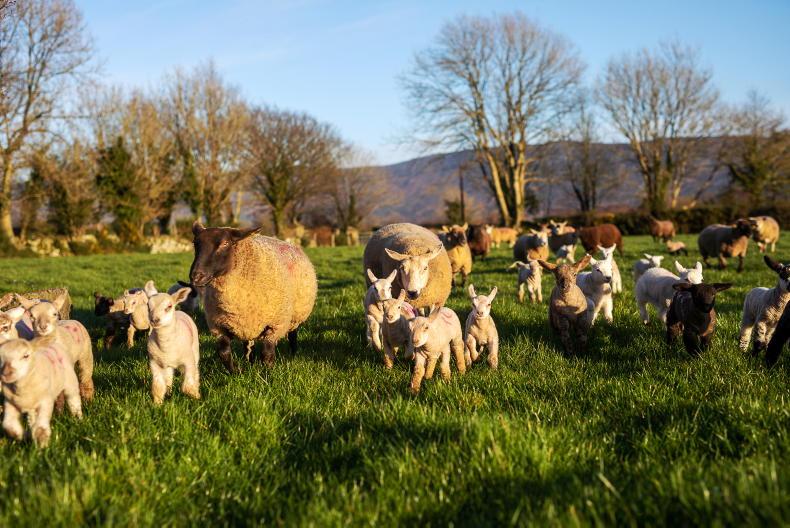The agriculture sector is not starting from a point of inaction when it comes to environmental improvements, according to Department of Agriculture chief inspector Bill Callanan.
Callanan said the commitments outlined for Irish farmers in the Climate Action Plan 2021 “build on progress to date”.
He described how the ambitions laid out in Food Vision 2030 address “sustainability in all its dimensions” and identify Ireland’s potential to become a world leader in sustainable food systems.
Bill Callanan was speaking at a meeting of the Oireachtas Committee on Environment and Climate Action on Tuesday, as it continued to consider the carbon budgets which have been set for Ireland.
Value over volume
Providing his opening statement to the committee, Callanan said that current agriculture policy, such as that outlined in Food Vision 2030, is “about targeting increases in value growth rather than volume growth”.
He said this involves the sector evolving and adjusting to a more sustainable way of farming that uses fewer inputs and relies instead on new technologies and new practices.
Callanan said the Climate Action Plan goes “hand in hand” with the Department’s ambition to ensure that Ireland can continue to produce high-quality food in a manner that protects the environment and mitigates climate change.
However, Callanan said that early action and high levels of take-up will be required across all of Ireland's 135,000 farms if the sector’s carbon emission reduction target of 22% to 30% is to be achieved by 2030.
He highlighted that this will involve managing emissions from the dairy herd and transforming the model of beef production.
Methane
On the need to reduce agricultural methane, Callanan conceded that this is “more challenging”, as the technological advances are currently not available in the marketplace.
“Progress on methane is expected to accelerate within the second five-year carbon budget, as methane-reducing feed additives become commercially available.”
He outlined how the Department is continuing to “significantly fund and participate in international research” in order to address the methane challenge from pasture-based livestock production systems.
However, the Department chief inspector said that in the short term, the global focus must be on cutting fossil methane, something the European Commission will legislate for in 2022.
Fertiliser
Callanan said that his Department will have a significant focus on reducing nitrous oxide emissions in agriculture, mainly associated with the use of chemical nitrogen fertiliser.
Describing the proposals on nitrates, he said: “A national fertiliser register of compliance will be developed and reductions in chemical nitrogen allowances will help achieve our objectives, as will support, such as training and advisory services, to underpin this transition.”
Read more
Agriculture must ‘bite the bullet’ on methane – Maynooth professor
Farmers will cull cows if there are incentives – Teagasc
The agriculture sector is not starting from a point of inaction when it comes to environmental improvements, according to Department of Agriculture chief inspector Bill Callanan.
Callanan said the commitments outlined for Irish farmers in the Climate Action Plan 2021 “build on progress to date”.
He described how the ambitions laid out in Food Vision 2030 address “sustainability in all its dimensions” and identify Ireland’s potential to become a world leader in sustainable food systems.
Bill Callanan was speaking at a meeting of the Oireachtas Committee on Environment and Climate Action on Tuesday, as it continued to consider the carbon budgets which have been set for Ireland.
Value over volume
Providing his opening statement to the committee, Callanan said that current agriculture policy, such as that outlined in Food Vision 2030, is “about targeting increases in value growth rather than volume growth”.
He said this involves the sector evolving and adjusting to a more sustainable way of farming that uses fewer inputs and relies instead on new technologies and new practices.
Callanan said the Climate Action Plan goes “hand in hand” with the Department’s ambition to ensure that Ireland can continue to produce high-quality food in a manner that protects the environment and mitigates climate change.
However, Callanan said that early action and high levels of take-up will be required across all of Ireland's 135,000 farms if the sector’s carbon emission reduction target of 22% to 30% is to be achieved by 2030.
He highlighted that this will involve managing emissions from the dairy herd and transforming the model of beef production.
Methane
On the need to reduce agricultural methane, Callanan conceded that this is “more challenging”, as the technological advances are currently not available in the marketplace.
“Progress on methane is expected to accelerate within the second five-year carbon budget, as methane-reducing feed additives become commercially available.”
He outlined how the Department is continuing to “significantly fund and participate in international research” in order to address the methane challenge from pasture-based livestock production systems.
However, the Department chief inspector said that in the short term, the global focus must be on cutting fossil methane, something the European Commission will legislate for in 2022.
Fertiliser
Callanan said that his Department will have a significant focus on reducing nitrous oxide emissions in agriculture, mainly associated with the use of chemical nitrogen fertiliser.
Describing the proposals on nitrates, he said: “A national fertiliser register of compliance will be developed and reductions in chemical nitrogen allowances will help achieve our objectives, as will support, such as training and advisory services, to underpin this transition.”
Read more
Agriculture must ‘bite the bullet’ on methane – Maynooth professor
Farmers will cull cows if there are incentives – Teagasc






 This is a subscriber-only article
This is a subscriber-only article










SHARING OPTIONS: